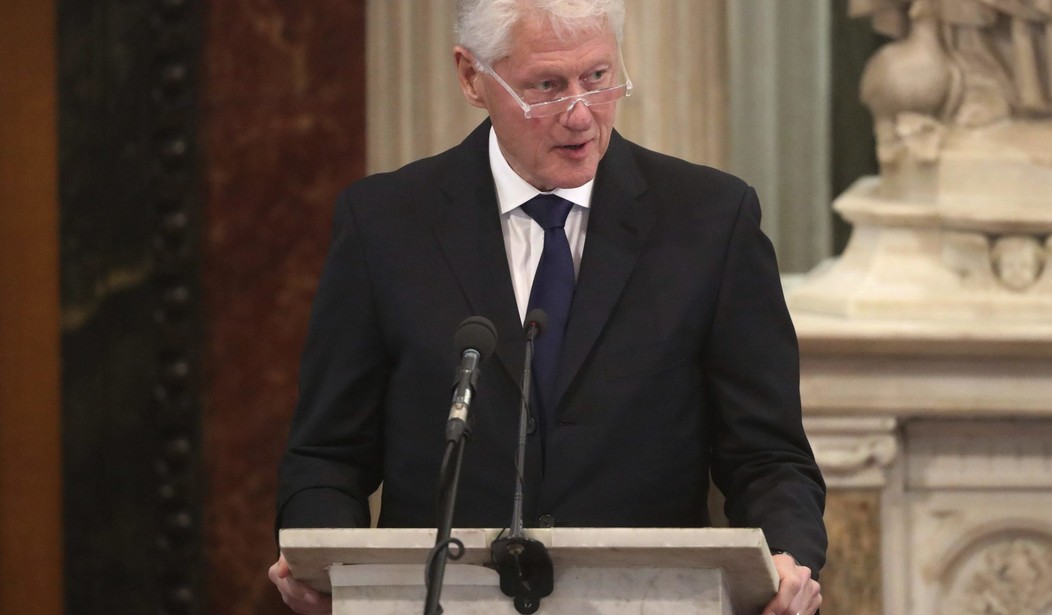Former President Bill Clinton revealed that five of his friends have lost their children to the opioid epidemic and encouraged activists to come up with a “sentence reduction and release program” for nonviolent offenders that includes opioid addiction treatment.
“We need to get these people who are essentially nonviolent offenders out of prison. But the thing that really bothers me is what was said – you don’t want to put people out without treatment, you could be given treatment now and somebody’s got to figure out how to persuade all these people who say in theory – I’ve never heard in the last 10 years at least as much bipartisan agreement on anything as I hear, in theory, there are too many people behind bars who shouldn’t be there,” Clinton said this week at the Clinton Foundation’s Health Matters Annual Activation Summit in Little Rock, Ark.
“We need to come up with a model, a sentence reduction and release program, that deals with treatment, that deals with all this. And this is something that maybe we can all work together on, because I found when you want change you can always find some reason not to do it if there is an organized effort on the other side. But I have never seen the feeling that exists today that we overdid this, that this whole sentencing craze that got going in the ’80s was just way overdone. We’ve just got to provide a safer, healthier, better way forward,” he added.
Clinton signed the Violent Crime Control and Law Enforcement Act of 1994 that some criminal justice reform activists have said caused mass incarceration in minority communities. The crime bill became an issue brought up by protesters at some of Hillary Clinton’s 2016 presidential campaign events. Hillary Clinton reportedly said mass incarceration was an unintended consequence of the crime bill.
Bill Clinton did not mention the crime bill during the health summit.
Clinton described his personal connection to the opioid crisis.
“I’m like every other narrow-minded person, I see everything in part through the prism of my own experience – five of my friends have lost their children to this epidemic,” he said. “Three of them, I thought, although I might be wrong, were basically the product of ignorance that you could not mix OxyContin and alcohol, and they went to sleep and never woke up. The other two were more complicated.”
Clinton referred to a vaccine that one of the panelists, Dr. Kim Janda, has been developing.
“The point is if you are right about this, I believe all five of them would have come in and at least tried this. You’ve got to be really deliberately suicidal not to give this a shot,” he said.
Dr. Janda, Ely R. Callaway Jr. professor in the Departments of Chemistry and Immunology at the Scripps Research Institute, said he tested an experimental vaccine in primates that could combat opioid addiction, but he has hit roadblocks trying to find a company to advance the vaccine.
“Addiction is not a moral failure on the part of the individual, and until we look at that in a different light we’re not going to get around this,” the doctor said.
Janda said the addict has to “make the desire” to get off the drug.
“I have vaccines developed for lots of different drugs, but if you don’t want to get off the drug or have the will to get off the drug, it’s not going to be useful,” he said.
Janda explained that there have been no human clinical trials yet for the opioid and heroin vaccine.
“I’ve talked to a number of big pharmaceutical drug companies, and they say you’re doing great work but we really don’t think this is an area that we can help you out with,” Janda said.
“Why, because they don’t think there’s any money in it?” Clinton asked.
“That’s pretty much spot-on, yep,” Janda replied.
Janda said the experimental vaccine is “not bulletproof,” meaning it won’t prevent an opioid or heroin addict from never wanting to use the drugs again. However, he said, the vaccine would “pull the drug out of the brain” or block the drug from “reaching the centers of the brain.”
“Then I would call it a cure, not a vaccine,” Clinton replied. “If that is there, we ought to be able to raise unlimited amounts of money to both develop and disseminate this in a hurry.”
Janda responded, “I think it would be great if we could get some of the pharmaceutical companies behind this that were involved with creating this epidemic that we have now. I think they need to take some responsibility.”
“It’s urgent,” Clinton said.
Richard A. Rawson, research professor at the Vermont Center on Behavior and Health at the University of Vermont, compared opioid addiction treatment to treating diabetes and cardiovascular disease. He said there are some opioid treatment options available right now.
“Treating this is less complicated than treating diabetes, and it’s less complicated than treating many types of cardiovascular disease and hypertension,” he said. “They are very effective and they are saving thousands of lives. We just need to get people access to these treatments.”
Dr. Judith Feinberg, professor of Behavioral Medicine and Psychiatry at West Virginia University School of Medicine, said Kentucky and West Virginia have probably been the “hardest hit” states in the country.
“What we really need – absent vaccine and something that would be a real preventive approach – what we really need is treatment on demand, and what I mean by that is unfettered access to quality evidence-based, medication-assisted treatment for opioid addiction,” she said.
According to Feinberg, some patients die of overdoses while on a waiting list for treatment.
“We really need to have enough people trained and capable of providing this kind of care, and certainly including primary care doctors,” she said. “People need to be able to seek care where they live, but if we don’t have enough treatment to meet the demand then bad things happen to people.”









Join the conversation as a VIP Member